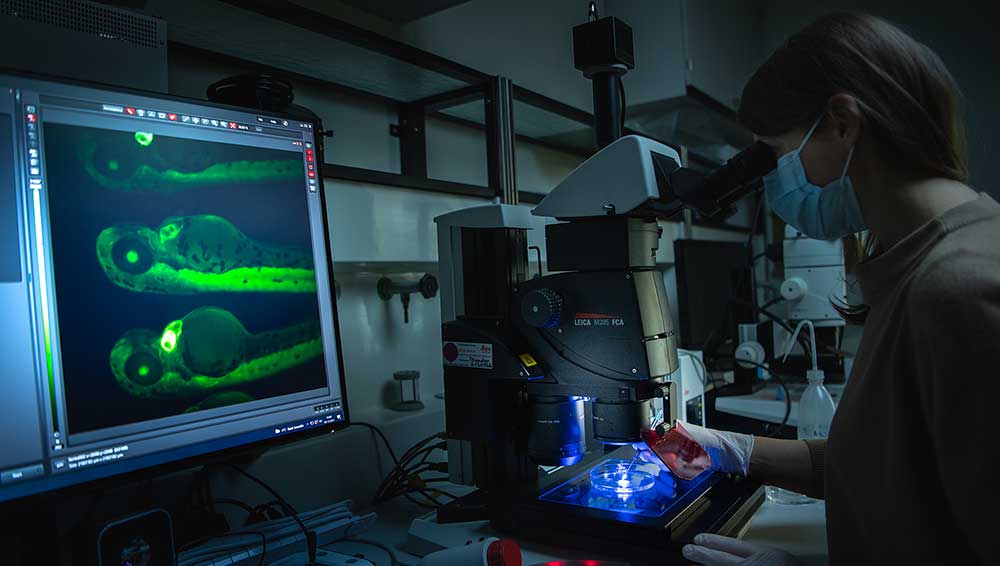“Animal experiments will remain indispensable in the foreseeable future”
In 2020, some 66,573 animals were used for scientific purposes at the University of Zurich. Just over 97% of these animals were used in research projects, and just under 3% for educational purposes. Nearly eight out of 10 of the animals used were mice – followed by amphibians (mainly larvae), rats, snow voles and fish. Researchers also used animals commonly kept as pets (cats and dogs) – often as patients in veterinary studies – and farm animals such as pigs, cows, horses, chickens, sheep and alpacas. Research involving animals benefits humans and animals alike. At UZH, the research questions are as diverse as the animal species that are sometimes used to explore them, ranging from behavioral studies to research on metastasizing tumors through animal models.
Great importance
“UZH conducts research involving animals to better understand health and diseases in humans and animals, and uses this knowledge to develop new treatments,” says Elisabeth Stark. Over the past few decades, animal experiments have been an essential part of many advances in human and veterinary medicine – including vaccines, cancer therapies or antihypertensive drugs, the Vice President Research adds. “Animals will remain indispensable to research in the foreseeable future.” This is because many complex biological processes can only be studied in live animals. Alternatives such as the use of cell cultures like organoids or computer simulations still have a way to go here, even though these methods are also applied and studied in great depth at UZH. The significance of research involving animals is illustrated by the following estimate: “About one-quarter of UZH’s research directly or indirectly depends on animal experiments,” says Elisabeth Stark.
Lack of alternatives
In Switzerland, the hurdles for using animals in research are high, and rightly so. Animal experiments are only allowed when there are no equivalent alternatives that could be used to achieve the desired research objective. Moreover, the expected gain in knowledge for research or the benefit to society must be greater than the animals’ distress. All animal experiments require prior approval and are thoroughly examined by the Commission on Animal Experimentation and the Cantonal Veterinary Office. This not only applies to studies in which animals may experience distress, but also, for example, to instances where veterinary students learn how to properly handle dogs or cows – these, too, are considered animal experiments.
Strict guidelines
“UZH recently approved a strict policy governing research involving animals. Our researchers are committed to upholding high ethical principles for experiments on animals, regardless of whether they’re carried out in Switzerland or abroad,” explains Elisabeth Stark. The University’s policy covers exemplary keeping of animals, proper training of the staff involved, careful planning of experiments as well as exercising every opportunity to mitigate the animals’ distress. This mitigation stands for the last of the three R’s in the 3Rs principle – replace, reduce, refine – which is prescribed by law. Wherever possible, research using animals is replaced with methods that do not involve animals, the number of animals in a study is kept as low as possible, and the stress caused to animals is reduced as far as possible.
Guided by animal welfare
Animal welfare is high on UZH’s agenda, and this is reflected in the development of the University’s Office for Animal Welfare and 3Rover the past few years. The team of Michaela Thallmair now counts four animal welfare officers, a biostatistics consultant and a 3R coordinator. Together, they look after the health and welfare of the animals involved in research projects. They support researchers when it comes to preparing experiments or submitting approval requests, promote the systematic use of 3R principles and are involved in training and continuing education. “The office reports directly to the Office of the Vice President Research and acts as a link between researchers and the authorities. Its work is always guided by the welfare of the animals,” adds Elisabeth Stark. In addition, UZH is also heavily involved in the Swiss 3R Competence Centre (3RCC), which promotes the 3Rs principles at the national level.
Open dialogue
Research that involves animals is an ambivalent matter, not only when it comes to evaluating interests, which is prescribed by law. The potential benefits for society of being able to better understand and treat severe diseases have to be weighed against the distress that the animals may experience during their breeding, keeping and involvement in research. “Many people thus take a critical view of experiments on animals and only find them acceptable in certain circumstances,” Elisabeth Stark points out. “This is why UZH wants to take an even more active part in engaging with the media, political authorities and the general public. We have to provide open and transparent information about how and why we use animals in our research – again and again.” This principle was also established at UZH last year, in its updated policy as well as the newly issued position statement.

